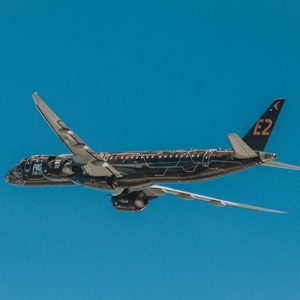Embraer, Pratt & Whitney complete 100% SAF flight test

July 15, 2022
BY Embraer
Embraer and Pratt & Whitney have successfully tested a GTF-powered E195-E2 aircraft on 100 percent sustainable aviation fuel (SAF). The test, with one engine running on 100 percent SAF, validated that GTF engines and the E-Jets E2 family can fly on both engines with blends of up to 100 percent SAF without any compromise to safety or performance. The aircraft completed two days of ground tests at Fort Lauderdale International Airport, culminating in a 70-minute flight test at Vero Beach Regional Airport in Florida.
“The E2 is already the most efficient single aisle aircraft flying today, saving up to 25 percent CO2 emissions compared to previous generation aircraft. This reduction in emissions can be increased up to an impressive 85 percent with 100 percent SAF. Replacement of older aircraft by new generation products and scaling up SAF production are the two most effective actions commercial aviation can take now to achieve a significant reduction in emissions,” said Rodrigo Silva e Souza, vice president strategy and sustainability, Embraer Commercial Aviation. “Embraer and Pratt & Whitney are leading the industry with products that are more efficient for our customers and more sustainable for our society. This test demonstrates that the E2 is ready for 100 pecent SAF certification and operation once the industry finalizes standards.”
Advertisement
All Pratt & Whitney engines and Embraer aircraft are currently certified to operate with SAF blended up to 50 percent with standard Jet A/A1 kerosene, according to ASTM International specifications. Future specifications will enable blends of up to 100 percent SAF to maximize the emissions reduction potential of using fuel derived from sustainable, non-fossil-based feedstocks.
“SAF is a core part of our sustainability road map, and we continue to work with industry partners and regulators to support the development of a drop-in standard for 100 percent SAF,” said Graham Webb, chief sustainability officer at Pratt & Whitney. “This test proves that GTF engines can operate on any fuel, and that the E-Jets E2 family is ready for 100 percent SAF certification once the industry finalizes the standard for unblended SAF.”
Advertisement
The SAF used by Embraer and Pratt & Whitney was 100 percent Hydroprocessed Esters and Fatty Acids Synthetic Paraffinic Kerosine (HEFA-SPK) acquired from World Energy. HEFA-SPK is a specific type of hydrotreated renewable feedstock fuel used in aviation and is considered a leading alternative replacement for conventional jet fuel by the Commercial Aviation Alternative Fuels Initiative (CAAFI), due to the sustainability of its feedstock. The Pratt & Whitney GTF engine is the only geared propulsion system delivering industry-leading sustainability benefits and world-class operating costs. The Embraer E195-E2 powered by GTF engines represent the most environmentally friendly combination of airframe and engine delivering the lowest level of noise and emissions.
Related Stories
The U.S. Energy Information Administration maintained its forecast for 2025 and 2026 biodiesel, renewable diesel and sustainable aviation fuel (SAF) production in its latest Short-Term Energy Outlook, released July 8.
XCF Global Inc. on July 10 shared its strategic plan to invest close to $1 billion in developing a network of SAF production facilities, expanding its U.S. footprint, and advancing its international growth strategy.
U.S. fuel ethanol capacity fell slightly in April, while biodiesel and renewable diesel capacity held steady, according to data released by the U.S. EIA on June 30. Feedstock consumption was down when compared to the previous month.
XCF Global Inc. on July 8 provided a production update on its flagship New Rise Reno facility, underscoring that the plant has successfully produced SAF, renewable diesel, and renewable naphtha during its initial ramp-up.
The USDA’s Risk Management Agency is implementing multiple changes to the Camelina pilot insurance program for the 2026 and succeeding crop years. The changes will expand coverage options and provide greater flexibility for producers.
Upcoming Events










